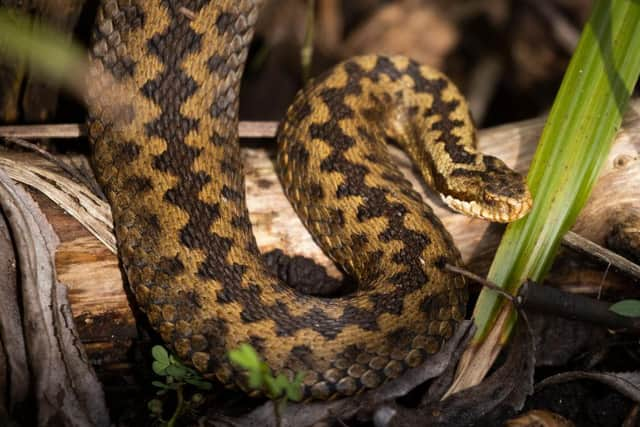Are there adders in Sheffield and should I worry about being bitten? This is what wildlife experts say
and live on Freeview channel 276
But are there adders in Sheffield and should people be worried about being bitten by one?
Adders, which are the UK's only native venomous snakes, have been seen in recent months on beaches in Wales and Norfolk, sparking concerns among some tourists.


What do adders look like and where are they can they be found in Sheffield?
Advertisement
Hide AdAdvertisement
Hide AdAccording to Sheffield and Rotherham Wildlife Trust, the small grey or reddish-brown snakes, with a darker and very distinct zig-zag pattern down their backs, are widespread across the country, where they can be found everywhere except for the Scottish Islands, the Isles of Scilly, the Channel Islands, Northern Ireland and the Isle of Man.
Adders, which are typically around 65cm long when fully grown and weigh 50-180g, prefer woodland, heathland and moorland, of which there is plenty in Sheffield and the Peak District.
They hunt lizards and small mammals and hibernate between October and March, when they are most likely to be spotted basking on a log or under a warm rock as they emerge.
They were once quite common but according to Sheffield and Rotherham Wildlife Trust has suffered ‘serious declines' due to the loss of habitat and persecution.
Advertisement
Hide AdAdvertisement
Hide AdThe trust has been trying to help by opening up areas for adders to sunbathe in and providing basking sites made from logs.
Are adder bites dangerous?
Although the adder is Britain’s only venomous snake, its poison is generally of little danger to humans, says the trust.
“An adder bite can be very painful and cause a nasty inflammation, but despite stories is really only dangerous to the very young, ill or old,” the trust’s website states.
"Adders are secretive animals and prefer to slither off into the undergrowth than confront and bite humans and domestic animals; most attacks happen when they are trodden on or picked up. Instead, they use their venom to immobilise and kill their prey of small mammals, nestlings and lizards.”
Advertisement
Hide AdAdvertisement
Hide AdThe best advice for anyone who encounters a snake while out and about is to leave it alone and try not to disturb it. All British reptiles are protected under law, and the adder is a species which is considered to be particularly at risk.
The wildlife trust said it had received no reported adder sightings in the last two years but this was not surprising as they are very secretive and are most likely to move into the undergrowth if they sense a human nearby.
A spokeswoman for the trust added: “On hot summer afternoons, adders can sometimes be seen basking in woodland glades or on heathland. If you are lucky enough to spot one, stay calm, keep your distance and it will likely move away in its own time. Stay on paths and keep dogs close on a short lead; most attacks only happen when adders are trodden on or picked up.”
If you spot an adder, you can report it at: wildsheffield.com/sightings.
What should you do if you are bitten by a snake in the UK?
If you are unlucky enough to be bitten by an adder the advice is to call 999 or go to A&E immediately while remaining calm as most snake bites in the UK are not serious and can be easily treated.
The NHS website also advises people to:
keep the part of your body that was bitten as still as you can
lie in the recovery position if you can
take paracetamol for any pain
try to remember the colour and pattern of the snake to tell the doctor
Advertisement
Hide AdAdvertisement
Hide Adtake off any jewellery and loosen clothes near the bite, in case it swells.
It says people should not:
go near the snake, or try to catch or kill it
try to suck or cut the poison (venom) out of the bite
tie anything tightly around the part of the body where the bite is
take aspirin or ibuprofen, as they can make bleeding worse.
